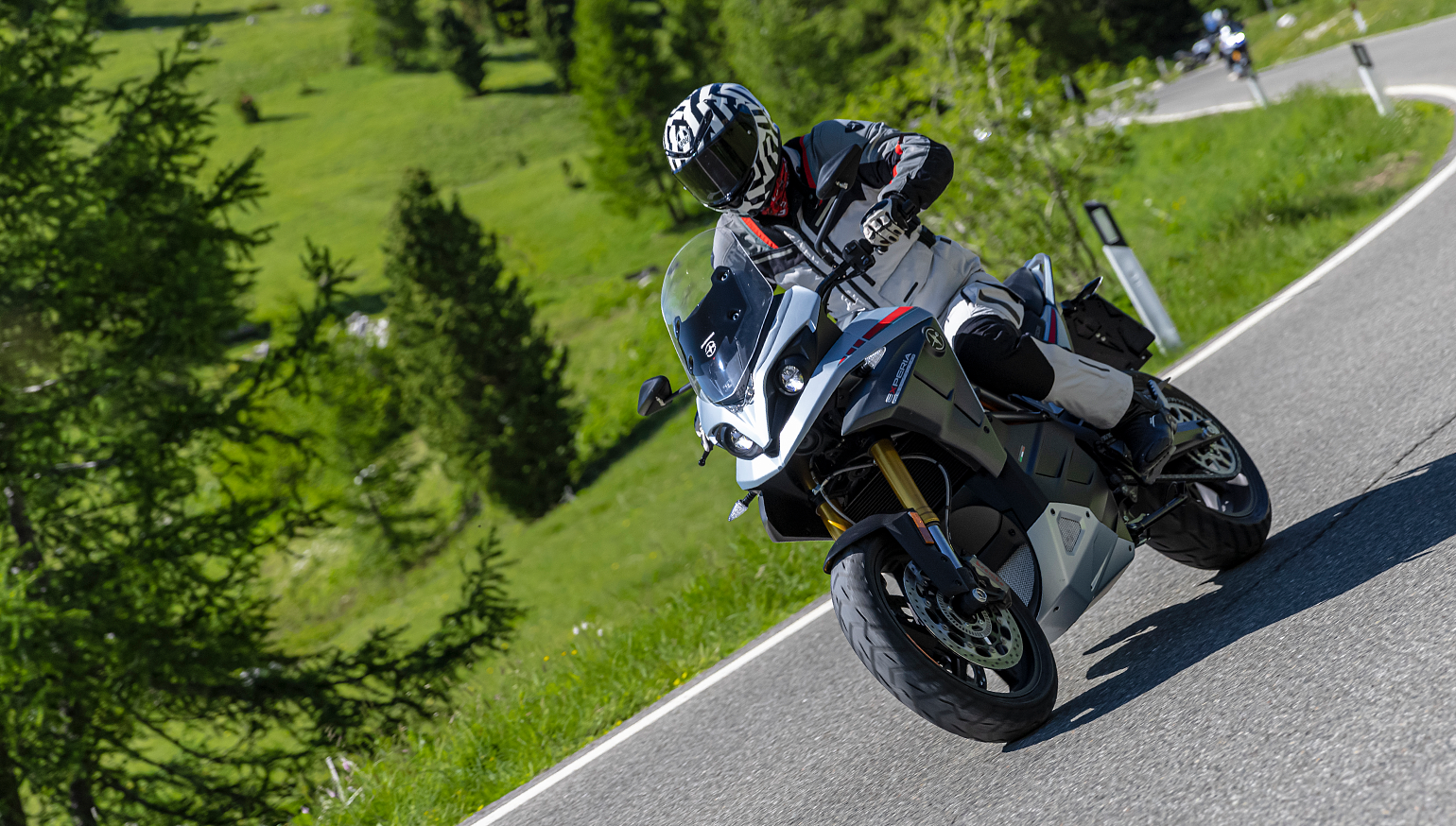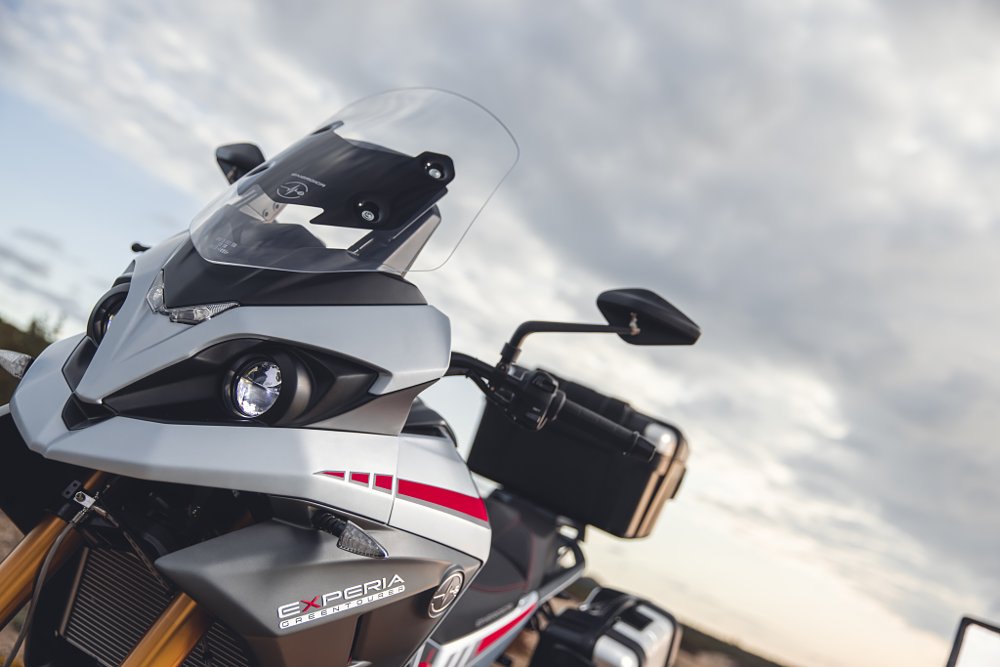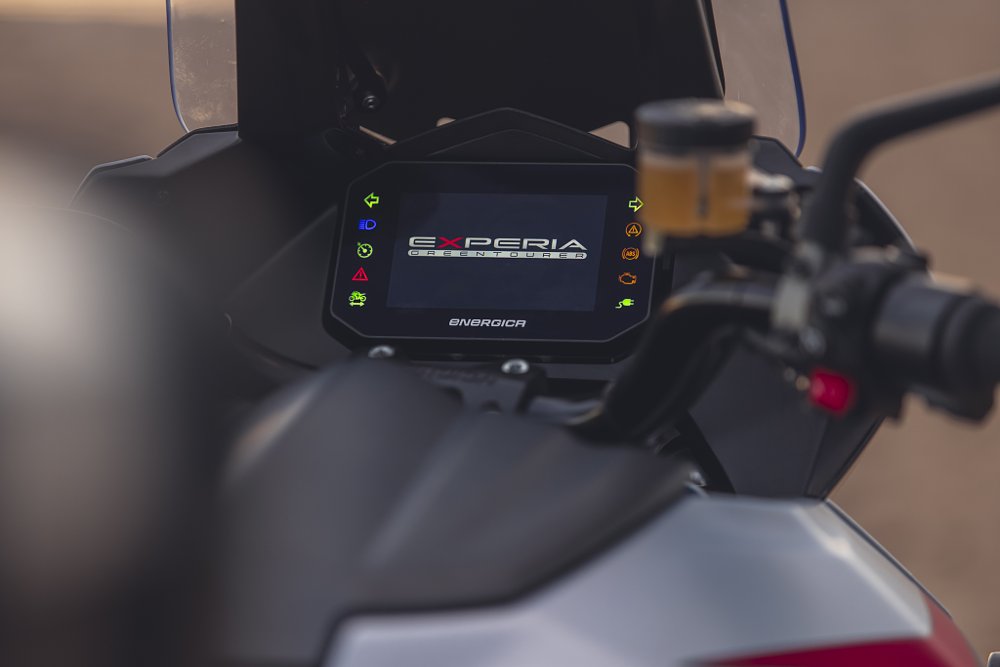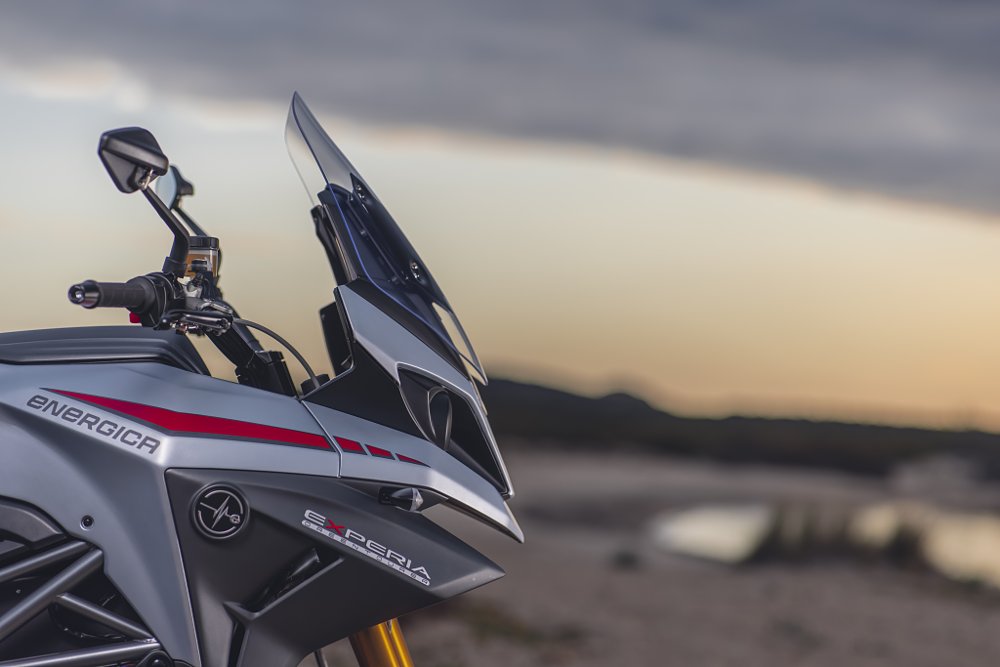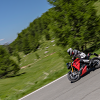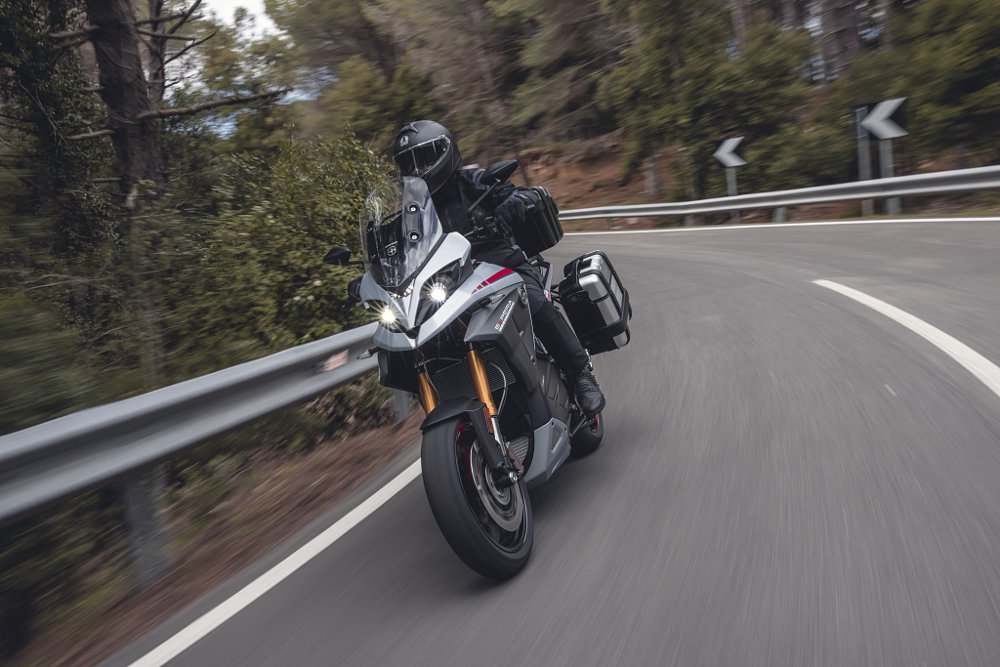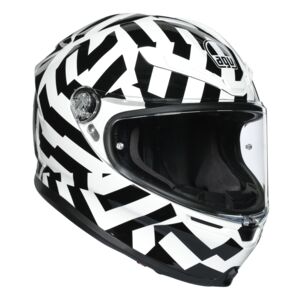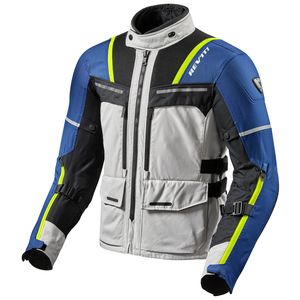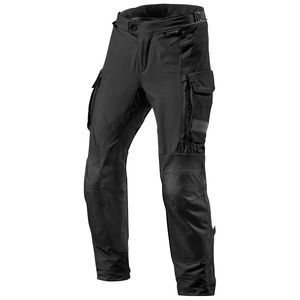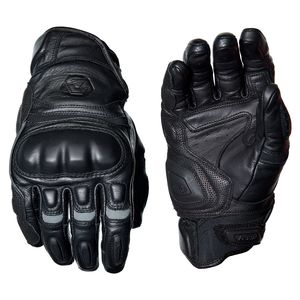In the current crop of electric motorcycles, riders have plenty of choices when shopping speed, horsepower, acceleration, and torque. These specs make electric motorcycles exciting over short distances, but their ranges aren’t nearly as dazzling as their sprinting abilities. Energica decided to prioritize range over all-out speed for its latest model, the all-new Experia.
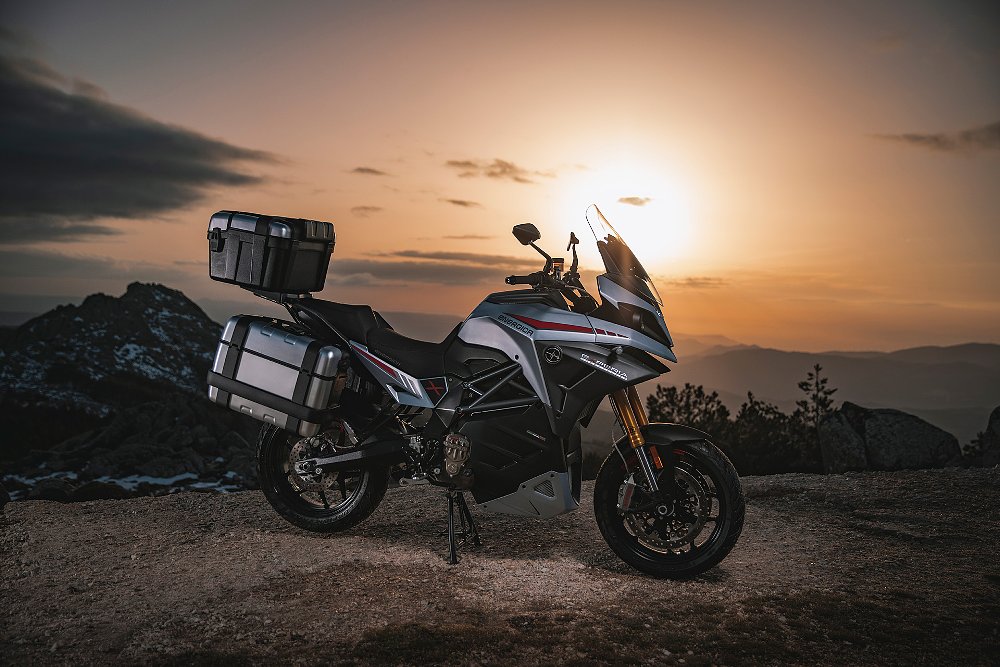
A clean-sheet drivetrain design provides claimed ranges of 261 miles city, 176 miles combined, and 134 miles highway. The Experia can use all three levels of charging, and Energica claims that the battery can recharge to 80 percent in 40 minutes with Level 3 DC. According to its creators, the Experia has the best range of any production electric motorcycle on the market. And with tour-oriented bodywork, serious luggage capabilities, and a seat built for two, the Experia ($23,750 base, $25,880 Launch Edition) is the only motorcycle of its kind.
Energica calls the Experia a “Green Tourer.” The phrase is even printed on the fairings. The Green Tourer concept advances Energica’s mission to deliver the best-performing electric motorcycles on the market. The Ego sport model carries the respect of Energica’s involvement in providing the race bikes for the MotoE series, which races in conjunction with MotoGP. The Eva and EsseEsse9 cover the naked and standard categories with class-leading specs and running gear. The next horizon for Energica — and every other electric motorcycle manufacturer — is better range. The Italians say the Green Tourer marks the beginning of the next generation of hi-po electric motorcycles.
Meet the Experia
The Experia makes 102 peak horsepower at 7,500 rpm and 80 continuous ponies at 7,000 rpm, with 85 foot-pounds of torque at the rear wheel. The Green Tourer pulls 0-60 mph in 3.5 seconds, and it tops out at 112 mph. In short, the Experia is far milder than the Ego and Energica’s other models, but it’s no slouch, either. Keep in mind that an electric motorcycle delivers power with unnatural immediacy. Energica says the new battery and motor designs are capable of bigger horsepower and 0-60 figures, but “the Experia power profile was designed specifically to ensure the longest range possible.” The bike’s final gearing was also altered to achieve this goal.
Energica invited me to test the Experia in the Dolomite mountains in northern Italy, a legendary riding destination. I spent a day with all four of Energica’s current models, and I didn’t give them any special treatment just because they were electric. The famed mountain switchbacks would be the perfect place to try sport-touring, Euro-style. However, Energica’s test route for the Experia was less than 50 miles, so I was not able to fully evaluate range and charge time, the two specs at the top of my list.
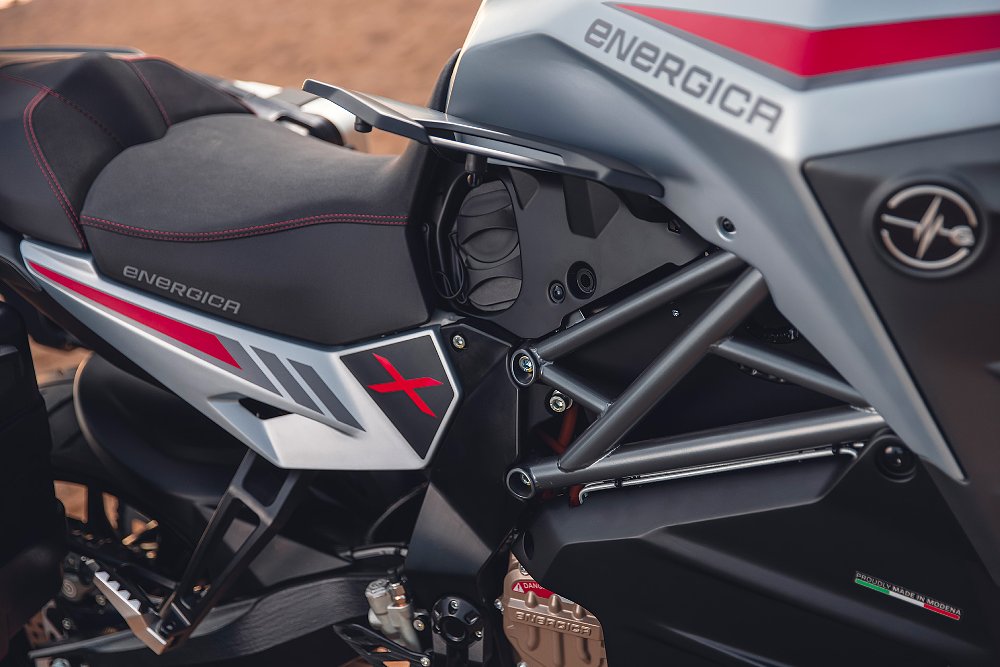
For what it’s worth, I don’t think Energica gave short test rides to avoid proper range tests. There are only a handful of production Experias in existence, and motorcycle reviewers outnumbered Experias two to one. Experia production won’t start in earnest until a factory expansion project is completed in July. My test bike was serial number 000004. Another rider had 000002… That’s it for my prefacing; let’s look at the facts.
Battery and motor
To push the boundaries of electric motorcycle range, Energica designed an all-new motor, battery, and chassis for the challenge. This architecture will also underpin more new models, and although Energica wouldn’t give any hints about what those models might be, the brand is off to a strong start with its new platform. The Experia tips the scales at 573 pounds, mostly due to the large battery tucked inside the steel trellis frame. It packs a claimed 19.6 kWh nominal and 22.5 kWh peak, which is substantially more than the LiveWire ONE’s 13.6 nominal and 15.4 kWh peak battery, or the 13.7 nominal and 15.6 peak kWh of the Zero SR/S Premium. The SR/S can be improved with a 1.6 nominal and 3.6 peak kWh Power Tank, but the upgrade limits the SR/S to its standard three kWh charging instead of the optional six kWh system. Energica claims the Experia’s new battery has “the largest battery capacity of any electric motorcycle.”
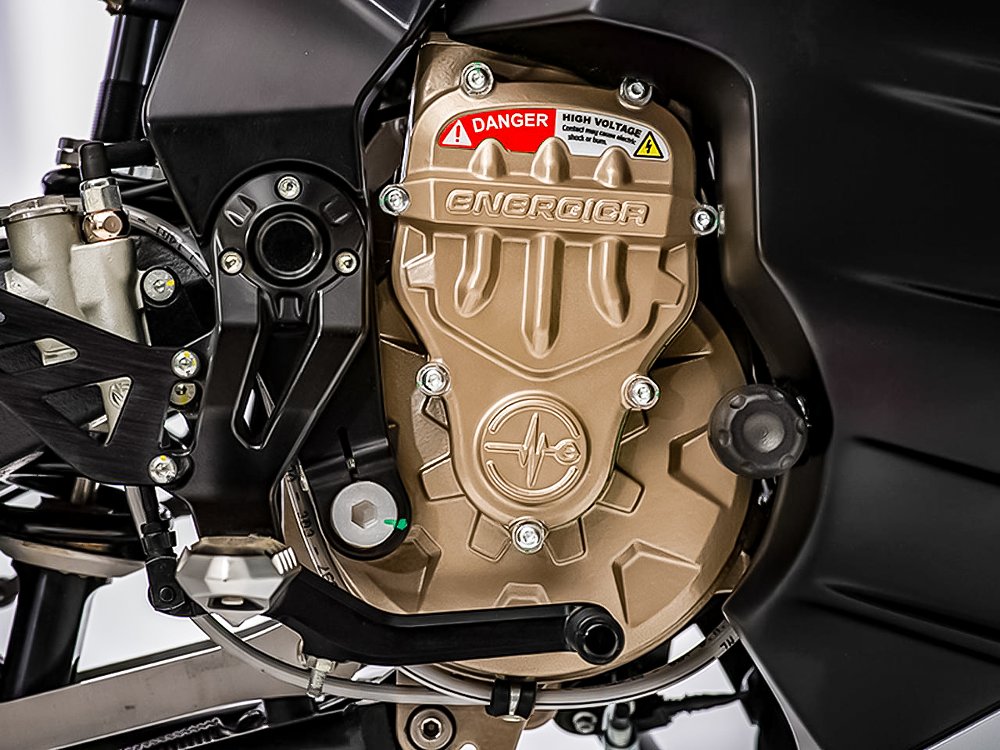
Energica says its new motor is a major advancement, too. A more efficient design uses permanent magnets and a few lessons from Energica’s MotoE racing experience to cut overall motor weight by 22 pounds while also increasing performance potential. The smaller, lighter rotor can spin faster than previous designs, and it doesn’t take an engineer to see the difference in size between generations. Claimed peak efficiency is 96 percent. Again, the Experia’s focus on range means the motor gets relatively mild mapping.
Batteries and motors are nothing without the tech to run them. A five-inch color TFT display provides the interface for managing these technologies through buttons on the handlebar switch pods. Seven ride profiles (Sport, Urban, Eco, and Rain, plus three custom modes) allow the rider to adapt the Experia’s power delivery to current riding conditions. Six levels of traction control manage the eABS and cornering-enabled Bosch 9.3 MP systems. Like any modern sport-tourer, the bike features cruise control, and it even has a slow reverse because why not? Regen braking can also be adjusted on the fly to rider preferences and road conditions. Over-the-air updates and a more powerful app are on the way.
Chassis and running gear
The Experia’s new battery has a far more complex shape than the last generation’s rectangular box to allow a thinner profile in the newly narrowed frame. The radiator system for the inverter, motor, and rapid charger is tucked in front of the battery under the bike’s sharp bodywork.
Steel trellis tubes join geometric aluminum side plates, and a cast aluminum swingarm brings up the rear. The ZF Sachs monoshock’s 2.2-inch stroke translates to 5.9 inches of rear wheel travel. The shock uses traditional preload adjustment collars, and it also features rebound adjustment. I noticed a fairly broad section of preload adjustment threading to compensate for a passenger and luggage. Up front, ZF Sachs also supplies a 43 mm fork with 5.9 inches of travel. The fork is adjustable for preload and rebound and compression damping.
The Experia rolls on cast 17-inch wheels sporting Pirelli Scorpion Trail II rubber. These tires fit the popular street-ADV trend we’ve seen among recent sport-touring motorcycles. Power is sent to the rear wheel via a chain. Even better, I spotted a center stand on my test machine in addition to the basic side stand.
Braking is provided by Brembo: dual floating 330 mm discs up front with quad-pot calipers, and a single 240 mm disc in the back gripped by a two-piston caliper. The braking is augmented by the adjustable regen braking, but I’ll get back to that in my riding impressions.
One last notable point with the new chassis design is the seat height. Energica felt that its previous models were a bit too tall for shorter customers, so the new design was built with a more accessible saddle position in mind. At 33.3 inches, it’s no low-slung cruiser, although the narrow seat-front profile and low center of gravity make the Experia a lot more manageable than the numbers suggest.
Riding the Experia
My mind was still spinning with technical info as I swung a leg over my Experia test bike. I spent the morning riding Energica’s Ego RS, Eva Ribelle RS, and EsseEsse 9 RS models, and I was more than ready to get some time in the saddle with the new platform.
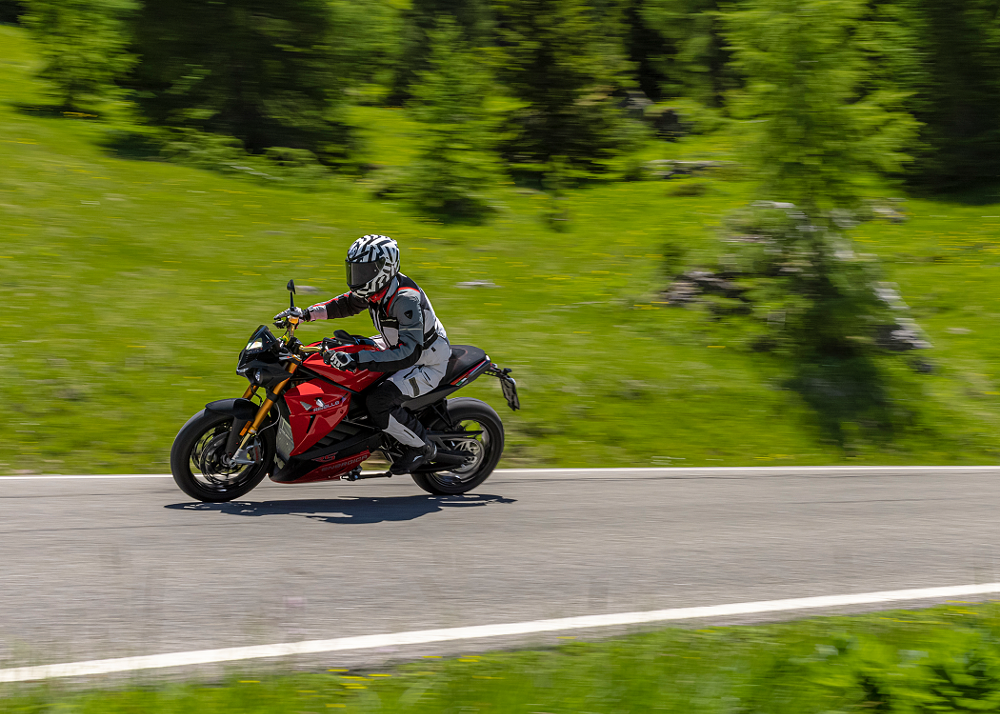
The startup procedure will be familiar to anyone who’s tried previous Energica motorcycles: Turn the bike on with the main power button, pull the front brake lever, and flip the activation switch on the right grip. A green indicator illuminates, and you’re ready to ride. While the Experia does not have a haptic “pulse” like the LiveWire to let the rider know that the throttle is active, the deliberate activation process and indicator light felt like enough to prevent any surprises. I twisted the throttle and found the same progressive, responsive motor control I’d experienced on the other three models. The mountain roads were waiting. I selected Sport mode with full regen, then began my ascent.
The Dolomites are a dream destination for many riders. They’re also a dream destination for bicyclists, car enthusiasts, and the van life crowd, so these scenic switchbacks can get fairly crowded. Add local traffic, cargo trucks, buses, and even the occasional cement mixer, and the narrow roads can get extremely tight. Road construction adds gravel sections for even more excitement. Thankfully, I had already navigated other Energica models through this route, and I was ready to see how the Experia handled this technical environment.
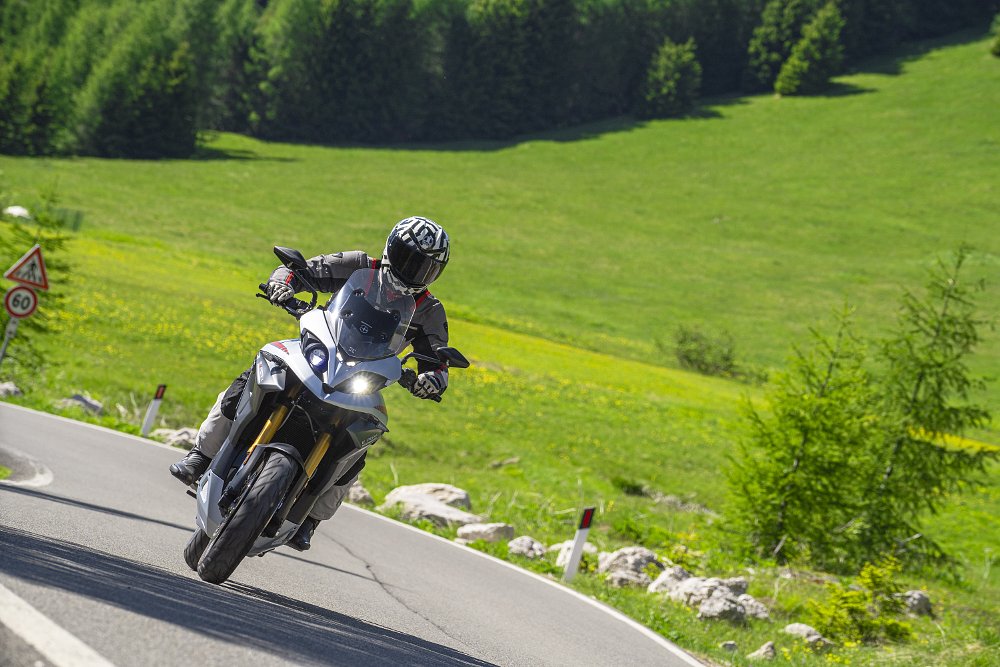
The Experia didn’t feel much heavier than the last-gen models I rode, nor should it, since the Ego, Eva, EsseEsse9, and Experia are all around 570 pounds. That said, the new drivetrain positioning means there should be less of a front-heavy weight bias on the new model, and the difference was noticeable when ridden back-to-back with other models. The Experia’s extremely low center of gravity also helps the bike feel lighter on its feet. And with Energica’s electric motor design, there’s no need to manage the bike’s heft by working a clutch or choosing the right gear. All Energica models are twist-to-go. The promotional video for the Experia does a nice job of capturing the motor's sound:
Progressive, predictable power comes on without delay. Closing the throttle intuitively decreases speed, and the last eighth of a turn or so controls regen braking. (Fully closed delivers full regen braking, of course.) There is a throttle position between accelerating and regen braking that allows the Experia to coast or freewheel. This zone was nice to use while descending hills behind larger, slower vehicles.
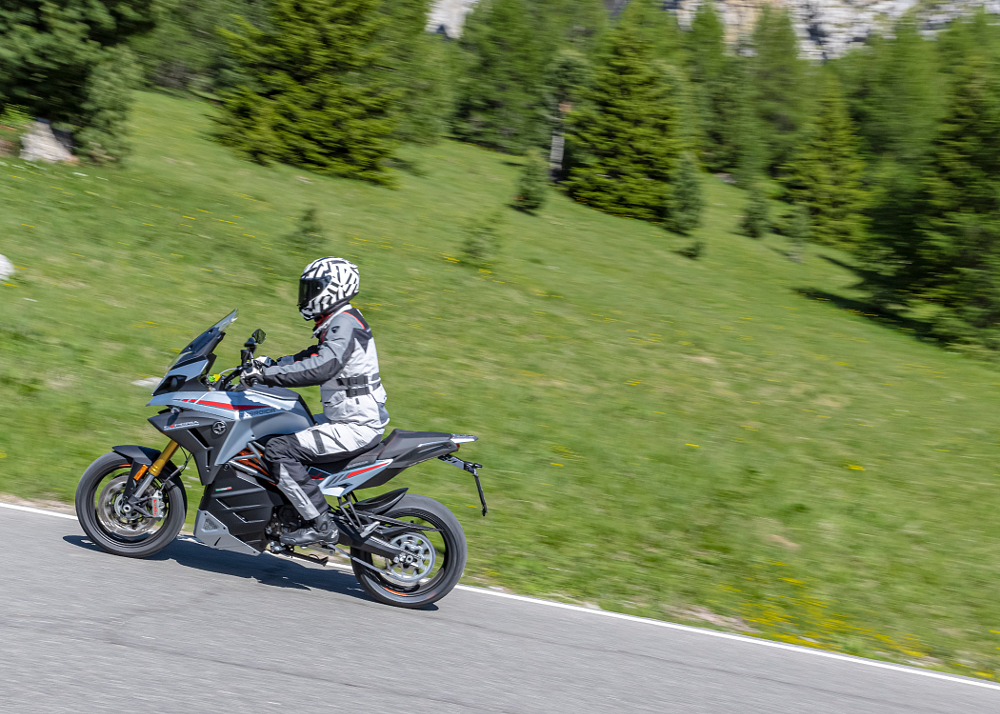
As soon as it was safe to pass traffic, the Experia could instantly exploit overtaking opportunities with its stonking torque. This motorcycle can get out of its own way, no problem. The upright riding position and tall-ish suspension gave plenty of comfort with good visibility, but the bike’s 17-inch wheels and large brakes leave plenty of potential for spirited riding, just like the recipe we’ve seen on the ICE side with motorcycles like the Ducati Multistrada Pikes Peak and the BMW S 1000 XR.
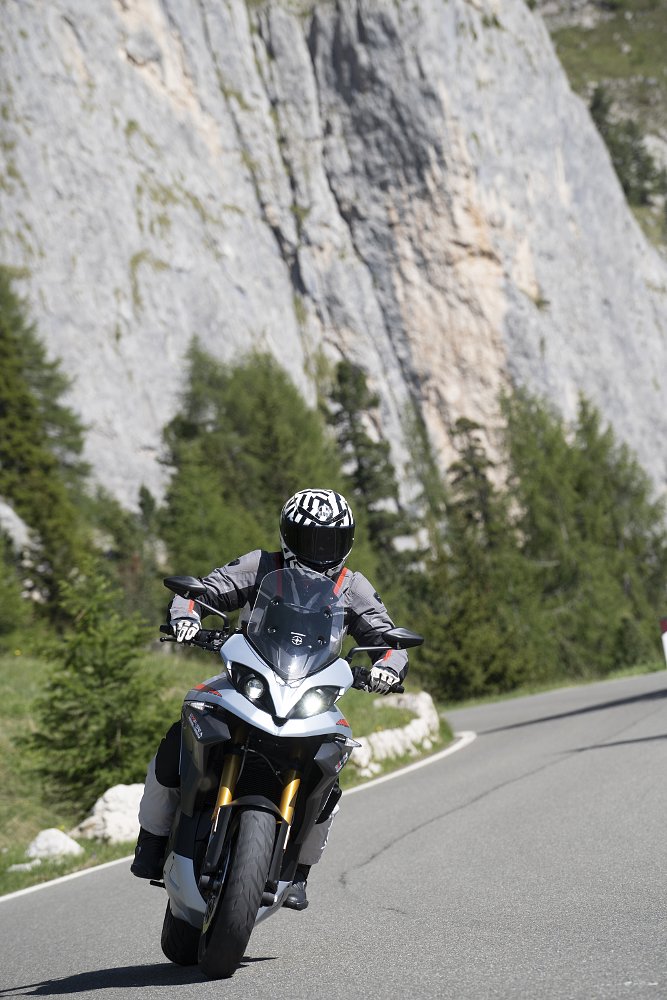
With full regen braking enabled, those Brembo disc brakes feel even more powerful. It’s tempting to wait later and later into a corner before touching the front brake lever, letting the regen braking do the work, but keep in mind that regen braking is provided by the motor, and the motor is connected to the rear wheel only. The front brakes are still the best way to set corner entry speed or haul the Experia to a quick stop. Fortunately, I didn’t experience the Experia’s eABS system, but I did feel the lean-sensitive traction control kick on during a slightly overenthusiastic corner exit. A little auto-modulation of the rear wheel kept the tire from breaking loose, and normal power returned as the road’s bend gave way to a long straight.
The Experia handles and brakes as it should. It’s comfortable and ready for cargo. All good things, but many other motorcycles, ICE or otherwise, check those boxes. What makes this motorcycle special?
In my opinion, the Experia stands out because it offers class-leading (claimed) range without nerfing the fun of riding. I’ll take extra range and utility over mega horsepower and hypercar 0-60 times all day long. And despite being Energica’s most practical motorcycle, the Experia isn’t boring or blunted. The new motor’s quiet shriek actually spins higher than the other street models, giving the rewarding impression of “revving out” for power. The motor whines like a supercharger as the tach needle tries to keep up. The only other sounds while riding are the tires rolling over the pavement, the brake pads gently hissing against the discs while slowing, and the wind.
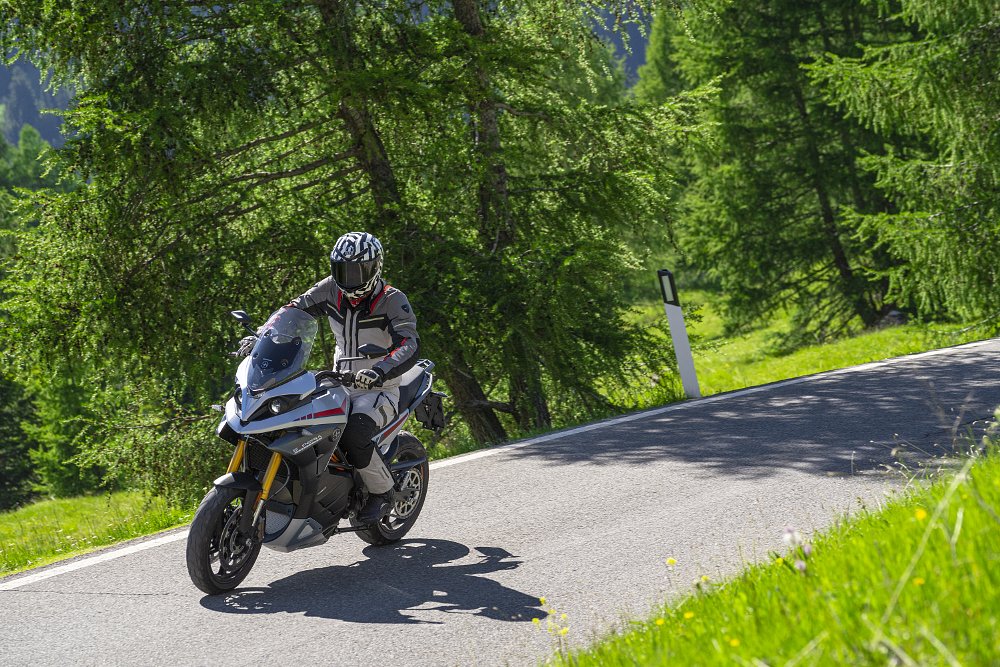
Practical electric motorcycling has been limited to urban centers or rare places like California where chargers are plentiful. Motorcycles built primarily for range could change the game. Again, I was not able to test the Experia’s full range, nor was I able to try recharging the bike, but some 40 miles of hard riding brought my battery down from 94 percent to 71 percent. Quick and wholly speculative math suggests that my short ride’s battery usage is in line with Energica’s claimed combined range of 176 miles.
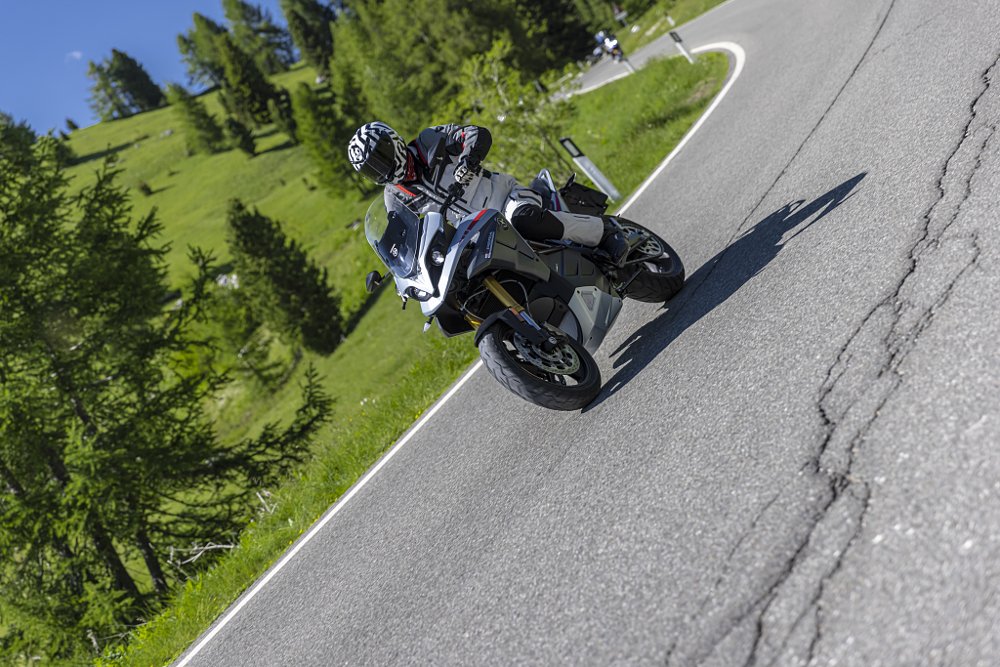
With more time, and on different roads, I would have enjoyed trying to hypermile the Experia in Eco mode, but the route was best enjoyed in Sport mode, or occasionally Urban mode for a more relaxed throttle profile. Some corners called for finesse and a smooth line, which the Experia always delivered, but when traffic thinned and a sharp set of switchbacks beckoned, Sport mode's power delivery made for an engaging and grin-inducing ride. A skilled Experia pilot could be the king of a local mountain from its quiet, comfortable throne, then stop by the grocery store on the way home. This is a truly unique motorcycle.
A good first impression
As first ride reviews go, this was the shortest press introduction I’ve attended, and while I understand Energica’s reasoning for the brevity of the route, I also understand that my evaluation of the Experia was too limited to give a complete and final opinion on it. That would be a disservice to the bike’s creators, its customers, and my credibility as a guy who reviews motorcycles for a living. So I’ll leave you with a plan of action if this motorcycle piques your interest. I had the chance to speak with Energica CTO Giampiero Testoni, and I asked him what he’d say to someone who had never ridden an electric motorcycle before.
“Take the keys,” he said. “We’ll meet here in one hour, and you can ask me any questions you still have.” This is a vehicle for a mature rider who believes a) that electric motorcycles are worth their price tags, b) that planning a tour around electric power is worth the effort, and c) that gliding along with silence and power is a tremendous amount of fun. I agree with Mr. Testoni that there is no substitute for taking a ride, however short, to experience the performance of modern electric motorcycles.
Launch Edition Experias are currently available for preorder at the Energica web site, where you can also schedule a test ride. The base Experia will be available by the end of 2022. Hopefully, Common Tread will be able to secure a long-term loaner to fully test the Experia’s abilities.
| 2022 Energica Experia | |
|---|---|
| Price (MSRP) | $$23,750 base, $25,880 Launch Edition |
| Motor |
Permanent Magnet Assisted Synchronous Reluctance Motor (PMASynRM)
|
|
Transmission, final drive |
N/A, chain |
| Claimed horsepower | 80 @ 7,000 rpm continuous, 102 @ 7,500 rpm peak |
| Claimed torque | 85 foot-pounds |
| Frame | Steel trellis with aluminum side plates |
| Front suspension | ZF Sachs 43 mm fork, adjustable for preload, rebound, and compression; 5.9 inches of travel |
| Rear suspension | ZF Sachs shock, adjustable for TK preload and rebound; 5.9 inches of travel |
| Front brake | Dual Brembo four-piston radial calipers, 330 mm floating discs, eABS |
| Rear brake | Brembo two-piston caliper, 240 mm disc, eABS |
| Wheelbase | 59.5 inches |
| Seat height | 33.3 inches |
| Claimed range | 261 miles city, 176 miles combined, 134 miles ex-urban/highway |
| Claimed battery capacity |
19.6 kWh nominal, 22.5 kWh maximum
|
| Claimed charge rate |
248 miles/h (Fast Charge DCFC Level 3 Mode 4), 39.5 miles/h (Slow Charge Level 2 Modes 2 or 3)
|
| Tires |
Pirelli Scorpion Trail II, 120/70R17 front, 180/55R17 rear
|
| Claimed weight | 573 pounds |
| Available | Late 2022 |
| Warranty | 24 months vehicle, 36 months battery |
| More info | www.energicamotor.com/us |

 Membership
Membership

